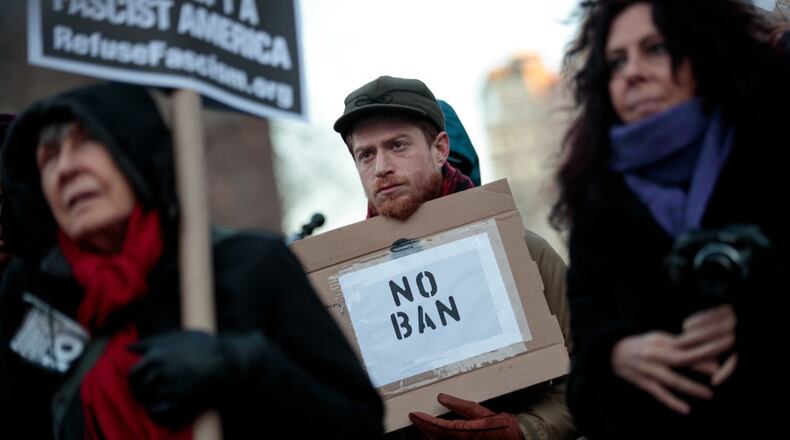A federal appeals court on Monday declined to lift an injunction that blocks part of President Donald Trump’s revised travel ban.
In a unanimous, 86-page opinion filed Monday, the 9th Circuit Court of Appeals wrote that the president violated U.S. immigration law by discriminating against people based on their nationality and that Trump failed to show their entry into the country would hurt American interests.
They didn't rule on whether the travel ban violated the Constitution's ban on the government officially favoring or disfavoring any religion.
White House press secretary Sean Spicer said at a news briefing Monday that officials are reviewing the circuit court's decision.
"I think we can all attest that these are very dangerous times," Spicer said. "We continue to be confident that the president's executive order ... will ultimately be upheld by the Supreme Court."
Trump issued his revised travel ban in March after a court refused to lift a temporary restraining order that blocked implementation of his first travel ban. The original executive order, dubbed "Protecting the Nation from Foreign Terrorist Entry into the United States," was issued one week after Trump's January inauguration.
The president's revised ban barred travelers from six Muslim-majority countries, removed a ban on Syrian refugees and excluded orders directing officials to consider a refugee's religion during the application process.
The 9th Circuit Court of Appeals wrote in its opinion that the government failed to prove its argument that individuals from the Muslim-majority nations targeted in the revised ban amounted to a heightened national security threat.
"The order does not tie these nationals in any way to terrorist organizations within the six designated countries," the opinion said. "It does not identify these nationals as contributors to active conflict or as those responsible for insecure country conditions. It does not provide any link between an individual’s nationality and their propensity to commit terrorism or their inherent dangerousness. ... The order does not offer a sufficient justification to suspend the entry of more than 180 million people on the basis of nationality."
Officials asked earlier this month for the Supreme Court to weigh in on whether the president's travel ban is discriminatory or unconstitutional. Trump had vowed to do as much after courts rejected his initial travel ban in February.
Trump lamented the revised travel ban in a pair of tweets last week, writing that the "watered down, politically correct version" was submitted to the Supreme Court.
The Associated Press contributed to this report.
About the Author
Keep Reading
The Latest
Featured



